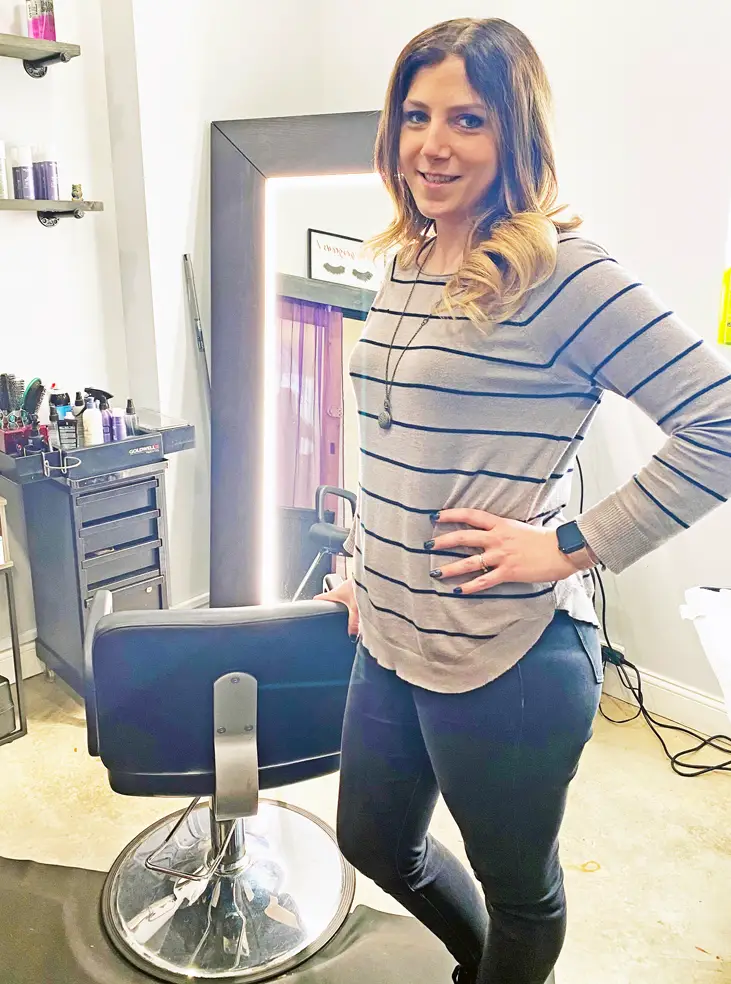CT legislators backing salons’ efforts to reverse ‘egregious’ licensing requirements
Walk into Smoke & Mirrors, a Newtown beauty salon owned and operated by Mary Straniti-Thompson, ask for waxing of extraneous facial hair ”” and be rebuffed.
“I can”™t do that anymore,” the Bethel resident told the Business Journal. “I found out that they suddenly changed the licensing and now you need a separate license for waxing.”

“A lot of us only found out about it during the shutdown” last year, affirmed Odete DaSilva, owner of Artistex Salon & Spa in Westport, and executive board member of the recently formed Connecticut Beauty Association. “All of us went to school, spent all this money and took the boards for all the services under the original license.”
That license included not only hairdressing and cosmetology, but also styling, barbering, waxing, nails and esthetics.
“A lot of people do both hair and nails, or hair and waxing, or hair and esthetics, which includes makeup,” DaSilva said. “And we had that ”” and we paid on average $20,000 to get the 1,500 hours required for the license, which is one or two years of school for most people.”
State Rep. Raghib Allie-Brennan (D), whose 2nd District includes portions of Bethel, Danbury, Newtown and Redding, became aware of the issue after being re-elected in November. “I asked Mary how I could be more helpful with her and her industry, and she told me about the licensing issue, which I was not aware of,” he said.

The licensing change was passed in July 2020 with little to no fanfare, Allie-Brennan said. “Thousands of businesses lost those rights overnight,” he said. “It was pretty egregious.”
The change took place after state Rep. Jillian Gilchrest (D-West Hartford) introduced legislation, co-sponsored by then-Rep. Fred Camillo (R-Greenwich) ”” now Greenwich First Selectman ”” to require employees at nail salons, estheticians, and eyelash technicians to complete a level of formal training and receive licenses to do their work.
The former chair of the Connecticut Trafficking in Persons Council told the Business Journal that the bill was originated after evidence of high levels of human trafficking was found in the nail salon trade.
“Connecticut was the only state that didn”™t license nail technicians,” Gilchrest said. “When you”™re that much of an outlier, you start thinking that something”™s wrong.”
While Connecticut began requiring manicurists to be licensed in the 1950s, those regulations expired in 1980. According to the state Office of Legislative Research, “In 1999, the legislature passed a law reestablishing a licensure program for nail technicians, which was never implemented and was repealed in 2001.”
Without licensing or proper oversight, Gilchrest said, nail salon owners were allowing those in their employ to only be paid per client, rather than by the hour ”” “which is not legal,” she said ”” and/or requiring employees to pay for their training by overcharging them for living on the salon”™s premises.
Gilchrest said, however, that her attempts to “legitimize” the industry ”” nail techs must now meet a variety of state guidelines and pay $100 for a license every two years ”” proved to have an unfortunate side effect.
“It was never the intention to punish individuals who were following the rules,” she said. “That was an unintended consequence, and I support (Allie-Brennan”™s) efforts to clean up the language and fix the intent of the legislation.”
After conferring with Straniti-Thompson and other salon operators, Allie-Brennan proposed House Bill 5580, “An Act Expanding the Qualifications of a Hairdressing and Cosmetician License to Include Waxing.” That bill is now before the Public Health Committee.
The legislator said he expects to broaden the bill to encompass more than waxing as it wends its way through the General Assembly. “I”™ve been in contact with the Department of Public Health and they appear to agree that how things stand now isn”™t fair.”
Straniti-Thompson said that waxing “can be a really great thing for us. Waxing takes 10 to 15 minutes, and if you can do four of those a day you”™re getting another $50 in your paycheck.”
Birth of a beauty association
Meanwhile, DaSilva said the seeds of the Connecticut Beauty Association were planted last spring, when salons and barbershops were told by the state they could reopen on May 20. When many protested that they weren”™t ready, given the lengths they needed to go to in order to properly follow Covid-19 protocols, they won a delay ”” by one week.
“It was clear to us then that the legislature didn”™t understand what our needs were and how they could be help us,” DaSilva said. “Everyone needed to reopen with PPE not even accessible at that time. A lot of them assumed we stand behind our clients, which may be true when you”™re cutting men”™s hair but not when you”™re doing coloring, especially women”™s hair.”
She said that along with others in her industry, she met with a number of attorneys and lobbyists to learn how to set up the CTBA ”” “in the middle of what was probably the craziest time to try and do it,” she laughed.
The group now has over 3,500 registered members, and a tax-free yearly membership is “valued at $50.” DaSilva said the group isn”™t necessarily looking to collect those fees in the short term, but is instead focusing on helping salons stay in business ”” she noted that the sector has yet to be included in the scheduled vaccine rollout ”” and keep an eye on the post-Covid future.
“So many of us do it ourselves. We”™re not just hairdressers but accountants, HR, marketing ”” we”™re all of it,” she said. “We want to give our industry one voice and help give guidance where we can on those other areas.”
